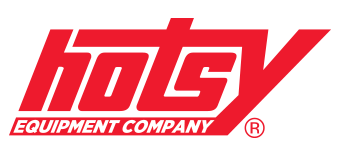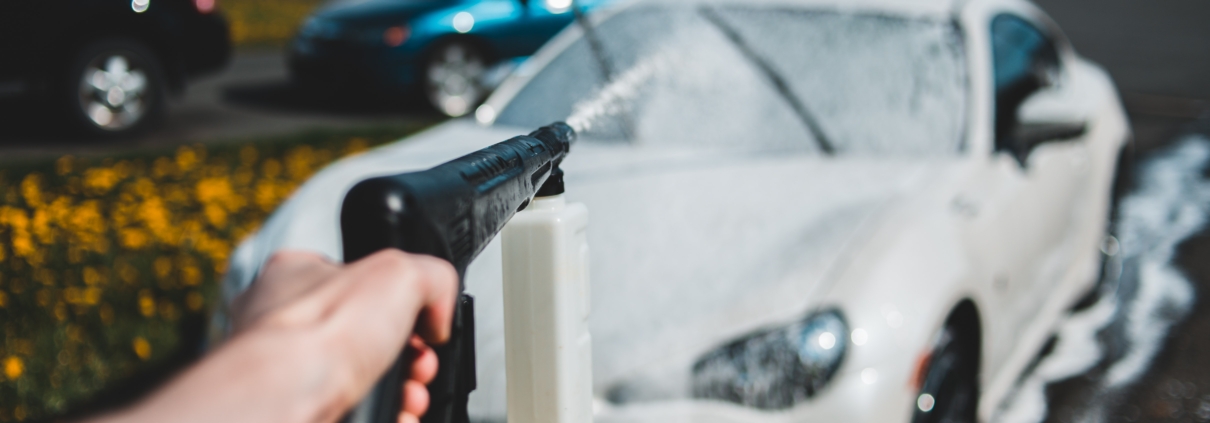Soft Washing vs Pressure Washing: What’s the Difference & Which Is Right for Your Business?
Business owners understand that keeping their property looking its best is important. The condition of the property is one of the first things that customers and clients notice — if your storefront is dirty or poorly maintained, they’re unlikely to come inside. If your storefront is clean and pristine, however, it can make a lasting impression. So how do you keep things looking nice?
That’s not all, though. Even if you don’t have any customers or clients visiting your facility – cleaning up is a regular part of your day. Whether you’re working at job sites or at your own facility, removing the mess at the end of the day is something you want to do quickly and effectively.
When it comes to cleaning commercial or residential spaces, you have two main options: soft washing and pressure washing. So what are they? What is the difference between them? And which option is right for you?
We will answer these questions and more so you can decide which option is the best fit for your business.
Soft Washing vs Pressure Washing: What’s the Difference?
Similar to the pressure washer vs steam cleaner debate, we’re going to break down each of these cleaning tactics on their own before comparing/contrasting them. Pressure washing and soft washing are two popular methods for cleaning a variety of surfaces. We will describe each method in detail to better demonstrate the differences between the two.
What Is Soft Washing?
Soft washing is the process of cleaning exterior surfaces using low-pressure and biodegradable solutions. It is an effective way to clean a variety of surfaces, including siding, decks, patios, driveways, and roofs. It uses a gentle stream of water mixed with cleaners to safely remove dirt, mildew, and other built-up grime. Soft washing uses a special nozzle that evenly distributes the cleaning solution and reduces the speed of the water stream. The low pressure also allows cleaners to penetrate deep into the pores of the surface, resulting in a thorough clean.
While it can be performed by anyone with the right equipment, this technique is generally best left to professionals. Soft washing requires specialized detergents and careful technique; improper use can damage surfaces. Furthermore, because soft washing involves the use of chemicals, it is important to take precautions to avoid contact with the skin and eyes. For these reasons, it is generally advisable to hire a professional for soft washing services.
What Is Pressure Washing?
Pressure washing, on the other hand, uses a high-pressure stream of water to break up and blast away stubborn stains and remove tough residues that regular cleaning methods can’t handle. It is an effective way to remove mold, mildew, and algae from outdoor surfaces. Pollen and other airborne contaminants can also be removed with pressure washing, which is especially beneficial for those with allergies. However, it is important to use caution when pressure washing, as the high-pressure water stream can damage some surfaces. When done correctly, pressure washing can leave surfaces looking brand new.
Pressure washing is a specialized task that should only be performed by trained professionals. Pressure washers generate a lot of force, so if they are not handled correctly, they can cause serious damage to property and to people. A qualified technician will have both the experience and equipment necessary to safely and efficiently clean your property, so it’s best to leave pressure washing to the experts to ensure a clean surface without damaging the underlying material. If you’re looking to get started with this cleaning tactic, our article on pressure washer safety is a must-read.
Key Differences
With both methods described, we can now point to the obvious and less-obvious differences between soft washing vs pressure washing:
- Pressure washing is best for hard, nonporous surfaces like concrete, stone, and metal, while soft washing is best for porous surfaces like wood, shingles, and stucco.
- Pressure washing uses high-powered water jets with up to 4,000 PSI to remove debris like pollen, sludge, paint, and other deeply ingrained dirt, while soft washing uses low-pressure water under 500 PSI to gently remove built-up grime.
- Pressure washing is more effective at removing hard-to-reach grime, like bird droppings and algae, than soft washing.
Soft Washing vs Pressure Washing: The Pros and Cons
Cleaning the exterior of your property is important to maintain both its beauty and safety — but how will you clean it? We will discuss the pros and cons of both soft washing vs pressure washing so you can make an informed decision on the best approach for your business’s needs:
Pros of Soft Washing
Many people choose soft washing because it is able to…
- Safely clean delicate surfaces and vehicles
- Carry less risk of damaging your property
- Effectively clean painted surfaces without stripping the paint
- Use less water, making it eco-friendlier than power washing
Cons of Soft Washing
Unfortunately, soft washing is also…
- Slower, as the process may need to be repeated if streaks or spots are left behind. With enough repetition, this process is no longer eco-friendly, either.
- Less effective at removing tough stains like oil, grease, and graffiti
- Repetitive, as visible stains may return if the underlying cause is not addressed
- Difficult to use for areas that are high off the ground
- Expensive, as cleaning solutions are needed in order to achieve lasting results
Pros of Pressure Washing
Many people opt for pressure washing because it can…
- Quickly and effectively clean heavily soiled surfaces
- Easily clean elevated areas, such as second-story windows and gutters
- Remove tough stains quickly
- Deep-clean grooves and crevices
Cons of Pressure Washing
Unfortunately, pressure washing can also…
- Strip paint and damage delicate surfaces if not done correctly
- Be dangerous to operate and cause injury if you are not experienced
When to Use a Soft Wash vs Power Wash
It is important to understand when each method should be used in order to get the best results. Here are instances that are better suited for either soft washing or pressure washing:
Soft Washing
As a general rule of thumb, if the surface you’re cleaning is porous or delicate in any way, soft washing may be the better approach. Such surfaces include…
- Parking lots
- Driveways
- Commercial and residential roofs
- Siding
- Shingles
- Vinyl
- Wood
- Fences
- Gutters
- Awnings
- Outdoor furniture
- Stucco
- Concrete patios
- Bikes
- Screened enclosures and lanais
Pressure Washing
Now – what is a hot water pressure washer used for? If the surface you are cleaning is sturdy enough for the force of a pressure washer, this will typically be the more effective route. Such surfaces include…
- High walls
- Cladding
- Loose paint on decks
- Building exteriors
- Commercial garages
- Driveways that are very dirty
- Pools
- Grease on commercial kitchen floors
- Industrial vehicles like trucks, boats, tractors, and dumpsters
- Drainage areas
- Chimney exteriors
- Ductwork on commercial HVAC units
- Parks and playgrounds
- Construction equipment
- BBQ grills
- Boilers
- Fences
- Entrance stairs and walkways
- Loading docks
- Dumpster areas
- Facades and awnings
Soft Wash vs Pressure Wash: The Verdict
So – which of these cleaning tactics is right for your business: soft wash vs pressure wash?
Ultimately, the best cleaning method for a particular property will depend on the type of dirt and grime that needs to be removed, as well as the materials that need to be cleaned. Weighing the pros and cons of each method will help you determine which is best for your needs.
In the end, we recommend going with the latter in the soft washing vs pressure washing debate. Pressure washers do everything a soft washer does – but more effectively and more efficiently.
If you’re looking for a pressure washer to clean your business’s outdoor surfaces, Hotsy is the best choice in the industry. We offer a variety of models to suit any application and provide all other supplies and accessories you need to get the job done right. Visit our pressure washer store today and browse the best selection of hot water pressure washers for sale. We even offer pressure washer rental if you just need a unit every once in a while. We’re the #1 choice for all your industrial cleaning needs — nothing cleans like a Hotsy!
Final Thoughts on the Pressure Washing vs Soft Washing Debate
When it comes to soft wash vs pressure wash, there are pros and cons to each method. Pressure washing is ideal for surfaces that are significantly dirty or stained, as it can remove built-up dirt and grime quickly and effectively. However, pressure washing can also damage delicate surfaces, and it is important to be careful not to use too much pressure when cleaning delicate materials.
Soft washing is a gentler alternative that uses lower pressures to clean surfaces. This makes it ideal for delicate surfaces. However, soft washing can take longer to clean surfaces than pressure washing, and it may not be as effective at removing tough stains. Ultimately, the best cleaning method for you will depend on the type of surface you need to clean and your own personal preferences.
Overall, though, if your surface can withstand either a soft wash or a pressure wash, we will generally recommend a pressure wash, as a pressure washer will get the job done faster and the results will typically last longer, as well.
Looking for a quality pressure washer? Be sure to visit Hotsy in Texas to get the best commercial pressure washer and all of your other cleaning supplies. With our equipment, your business will look like new again.



